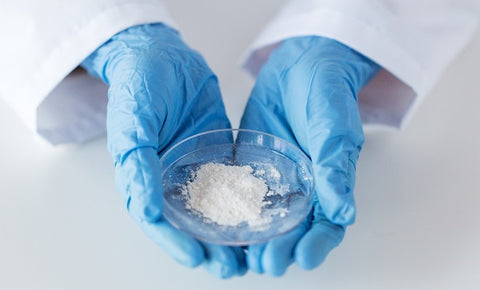What is CBD?

Introduction to CBD
CBD or cannabidiol is one cannabinoid compound (out of 100+ cannabinoids) extracted from a plant in the Cannabis genus group. Also called a phytocannabinoid, CBD is naturally created by the cannabis plant.
Most people are familiar with CBD being found in marijuana, but certain strains of hemp actually have higher concentrations of available CBD for extraction, hence the term hemp-based, or hemp-derived CBD. Due to the higher yield of CBD per hemp plant, it is the preferred version for CBD isolate. Note that there is no difference between 100% pure hemp-derived CBD or 100% pure marijuana-derived CBD.
What is CBD isolate?
CBD isolate is a term used for pure CBD crystals that have been extracted from the plant source. This plant source is usually either hemp or cannabis. This is the purest form of CBD possible and effectively isolated from the rest of the plant compounds. Pure CBD isolate is a crystalline structure of 99% (or +99%) CBD powder. The reason the term "100%" is not used is due to the limitations and tolerances of current testing machinery. But for all intents and purposes, 99% or +99% CBD isolate is as pure as you can find.
What does CBD isolate do in the Body?
CBD isolate connects with the body through the endocannabinoid system (ECS). This system contains receptors that respond to CBD when taken orally or topically. CBD can affect the ECS and regulate body processes such as: sleep, temperature control, learning, memory, pain, and inflammatory response. At this time, scientists are still mapping out the endocannabinoid system and new research is mapping the ECS in ways that we can better understand.
CBD and THC, Powerful Cannabinoids
CBD is related to another, probably more well known cannabinoid, THC, or tetrahydracannabinol. THC is the most strongly psychoactive compound of cannabis, and the one that produces the "high" or "stoned" feeling that many cannabis users enjoy. Both CBD and THC have therapeutic properties that can benefit the body with generally fewer harmful side effects than pharmaceuticals.
When taken together, CBD can moderate the effects of THC, depending on the ratio of CBD:THC. But many people do not want, or care for the psychoactive effects of THC and prefer to use products with solely CBD, aka CBD isolate.
CBD - The Potential Alternative to Medications
The pharmaceutical industry has brought many life-saving medications to the market. These medications have been amazing at treating illnesses and health conditions that otherwise would have had dire consequences. But, many of these pharmaceutical drugs have side effects that can range from being a nuisance to being deadly.
CBD has the potential to positively impact the healthcare industry as its benefits far outweigh the side effects. Plus, CBD can treat a whole host of seemingly unrelated disorders such as rheumatoid arthritis, autism, psoriasis, Crohn's disease, and more. This is due to the mechanism of action of CBD vs pharmaceuticals. To touch lightly on the subject, CBD interacts with the body's entire endocannabinoid system whereas pharmaceuticals tend to interact with very specific cells, or molecules in the body.
CBD and the Endocannabinoid System
CBD is a powerful compound that can interact with the endocannabinoid system (ECS) through two pathways. These pathways are receptors, CB1 (or CB1R) and CB2 (or CB2R). Note that CBD does not actually bind to CB1 receptors, but modifies the receptor for THC to bind to it.
Now, the ECS connects to the brain and many organs in the body. It's similar to the nervous system in that it is a communication highway between the brain and parts of the body. The endocannabinoid system helps regulate homeostasis, or balance. That's a simple analogy to help with the basic understanding of the ECS.